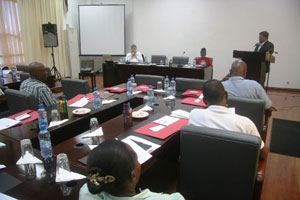MINISTER of Finance, Dr. Ashni Singh on Friday called on Permanent Secretaries, their Deputies and other Heads of Budget agencies to focus on more effective management of resources given their vital roles in the process of ensuring value for money in the delivery of their programmes. He noted that every sector has an essential role to play in contributing to national development, regardless of their size or call on budget resources.

The minister issued the call at the Ministry of Finance’s Monitoring and Evaluation Workshop held at the Guyana International Conference Centre. The workshop focused on results-based management and the 10 steps of building and designing a results-based Monitoring and Evaluation (M & E) system.
“As senior administrators…you have an obligation to constantly examine ways in which your sectors can be managed more effectively and efficiently, and achieve the outcomes that we have set ourselves and to set ambitious targets and work to achieve those targets set,” Dr Singh stated. He however cautioned that achieving those ambitions cannot be done in an ad hoc manner but by a systematic and structured approach to management.
Dr Singh emphasised that confronting the questions of where to allocate resources across competing objectives and determining the best way to allocate resources has led to the conclusion that the need for a robust system for evidence based policy making was essential in ensuring optimal use of finite resources. He highlighted that this must include strong systems for capturing data which will in the end serve to provide a rigorous basis for decision making.
Dr Singh observed that the workshop’s agenda was comprehensive, and focused on how to meet the targets set amidst the constraints which surround the sectors, and how these achievements can be made using alternative methods given finite, but competing resources.
He explained that the recognition of this had led the Administration to put in place the framework for achieving greater effectiveness in Government. This, Minister Singh, pointed out was done through the parliamentary procedure, with legislative changes in the Constitution.
The result was stronger mechanisms for oversight such as the standing sectoral committees. In addition, government wrote into the legislation an explicit recognition of the need to measure programme performance as outlined in the Fiscal Management and Accountability Act including the requirement for programme performance statements. This along with the inclusion of value for money audits in the Audit Act together ensured that the legislative foundation for results based managed was in place. It was followed by the computerization of government’s financial management to facilitate more timely information, the mandating of the development of the medium- term strategic plans and launching of capacity building initiatives in this regard.
He noted that the call for greater effectiveness was from very sector, whether it was in greater competiveness in tourism, more effective policing, improved student performance in the education sector, to name a few and it was a constant call from His Excellency for greater effectiveness. This call is for results based management, a call to monitor and measure performance.
The Finance Minister stressed that it was not sufficient to keep the wheels turning. Instead, ‘we should be asking ourselves if we are doing things the way they should be done and it was important to take time to pause to consider how to do it more effectively’.
The workshop was conducted by Dr. Ray Rist, a renowned world authority on developing monitoring and evaluation systems and co-founder of the International Program for Development Evaluation Training. Dr Rist focused on topics which covered the 10 steps to building and designing an M & E system. Those are: conducting a readiness assessment, agreeing on outcomes to monitor and evaluate, selecting key indicators to monitor outcomes, baseline data on indicators, planning for improvement, monitoring for results, the role of evaluations, reporting findings, using findings and sustaining the M & E system within the organisation. This is part of an ongoing series of capacity building initiatives on monitoring and evaluation across government which is being led by the Ministry of Finance.
IPDET is an executive training programme that aims to provide managers and practitioners with the generic tools required to evaluate development policies, programmes, and projects at the local, national, regional, and global levels. The programme features in-depth workshops, taught by renowned international faculty members drawn from southern and northern organisations.



.jpg)








